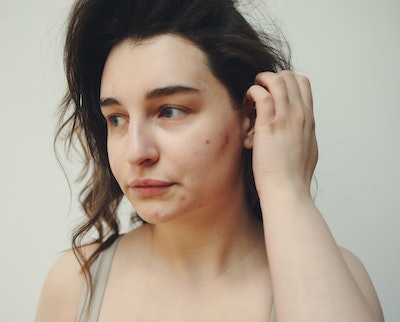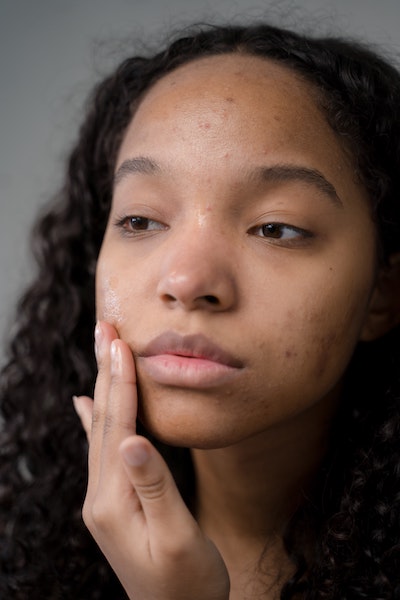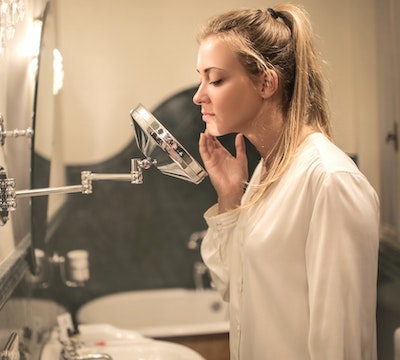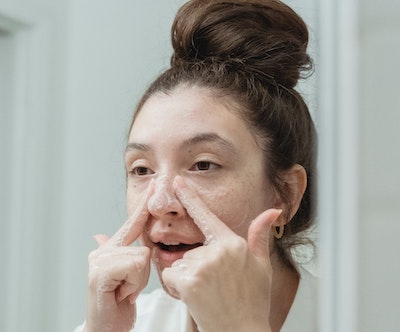
Article by Macy Tollefson – doula, breastfeeding specialist & prenatal yoga teacher
I know that dealing with acne can be frustrating – especially as an adult, and ESPECIALLY while pregnant.
Society tells us that pregnancy is a time when we’re supposed to be glowing with gratitude and happiness for nine months, only focusing on the health of our babies and not how we look… but it’s a lot more complicated than that, isn’t it?
Although it is VERY common, experiencing pregnancy acne can really impact your self-esteem and make you feel less-than, or insecure. Trust me, I’ve been there too.
The good news? Pregnancy acne is manageable, and it is not trivial or vain to want to treat it.
While there are so many different options for treating acne, there are certain things you need to keep in mind, along with specific ingredients and treatments you should AVOID while pregnant or breastfeeding.
Keep on reading to learn why pregnancy acne is so common and check out my tips and tricks on how to treat acne breakouts in a SAFE way.
This article is not a substitute for medical advice.
Is Acne A Sign Of Pregnancy?
Even when we aren’t trying to conceive, our progesterone levels rise just before our period begins, which is why some of us experience hormonal acne directly before that time of the month1!
However, if you spot some new acne breakouts while you ARE trying to conceive, it could mean your body’s hormone levels are changing and preparing for pregnancy.
While you shouldn’t use new acne breakouts as the sole, early indicator that you are pregnant, it is common to develop acne early on in your pregnancy.
This is due to the DRAMATIC fluctuation of hormones, that every woman experiences during pregnancy. In fact, around 40% of women will develop new acne during their pregnancy2.
Does Pregnancy Cause Acne?
While pregnancy alone does not always mean you will develop acne, there are some crucial hormones that fluctuate throughout the nine months, that are directly related to acne production.
Progesterone is an important hormone that helps prepare the uterus for pregnancy and support your growing baby- but it is also the hormone that contributes to acne breakouts.
The hormone progesterone stimulates your skin’s oil production, which can lead to clogged pores. Clogged pores, unless treated properly, can then lead to acne breakouts.
For some, pregnancy acne occurs as a result, but for others, this oil production may be subtle.
Other acne-contributing factors may include a weaker immune system (which can happen during pregnancy3 and an increase in stress hormones.
In a 2017 study on pregnancy acne, 90% of participating women who developed acne during their pregnancy, were experiencing acne at some point BEFORE they got pregnant4. This means that while pregnancy hormones contribute to acne breakouts, the biggest determinant is really having a history of acne.

At What Stage Of Pregnancy Do You Get Acne?
Although acne can pop up at any time during (or after) your pregnancy, you are most likely to see it develop during your first trimester. This is because your hormone levels are beginning to fluctuate dramatically, as compared to your pre-pregnancy levels.
For example, progesterone begins to rise exponentially during your first trimester, which is when you’re most likely to see pregnancy acne start.
With that being said, every person is different! You may see acne flare up during the third trimester as well, because this is when another surge of hormones takes place.
Does Pregnancy Ace Go Away?
Studies have not found definitive timelines of when pregnancy acne goes away, and truthfully, every person is different.
Some pregnant women experience acne only in early pregnancy, while others will have it for the entire 9 months. Some women may only see pregnancy breakouts pop up in the third trimester, and others may never experience it at all!
Acne that flares up during pregnancy is likely due to all of the hormonal changes, so when your hormones come back down to a “normal” range, you should see your acne calm down.
For some, progesterone will go back to “normal” levels directly after birth, but for others, it may take a while into postpartum for that to happen.
In fact, some moms may actually see NEW acne breakouts during postpartum! This could be from your hormones adjusting back to “normal”, or even continuing to rise due to breastfeeding.
Postpartum acne could also be related to stress.
Just as progesterone causes more oil (sebum) production and clogs pores, so does the stress hormone, cortisol. Adjusting to your new life as a parent is bound to bring some level of stress, but rest assured that you will get the hang of it! It will not always feel this stressful and overwhelming.
Postpartum acne could also be caused by dry skin and dehydration. If you are expressing your breastmilk, you need to be drinking much more water than usual. If you are not staying hydrated, your skin may be creating more pore-clogging sebum.
It is really up to you whether or not you would like to seek any treatments or interventions for your pregnancy (or postpartum) acne. Having acne itself is not physically dangerous to you or your baby, and it’s likely to resolve itself eventually.
However, if you are finding that developing acne is affecting your mental health or overall self-esteem – it is totally ok to want to treat it!
If you are wanting to treat persistent acne breakouts, keep reading for some pregnancy-safe options, and what treatments or products to AVOID.

How To Get Rid Of Pregnancy Acne – Safe Treatment Options
Let me start off by saying, it is not selfish or vain to want to get rid of breakouts, but the problem is, a lot of our favorite ways to treat acne are NOT pregnancy safe.
Many of the oral acne medications we are prescribed pre-pregnancy are actually DANGEROUS to use during pregnancy, or while breastfeeding. One of the most common acne treatments prescribed today, Accutane, is EXTREMELY dangerous to developing babies, and can cause serious birth defects.
ALWAYS consult with your doctor before continuing to take an oral medication, once you find out you are pregnant.
It’s tempting to want to use harsh and intense topical acne treatments to fight an acne breakout, but the truth is, gentle and simple products are usually more effective in the long run. Focus on keeping your skin clean and moisturized, to really protect your skin barrier and help it heal.
A gentle cleanser (such as one made with green tea, which is antioxidant, anti-inflammatory and antimicrobial) that doesn’t strip your skin of its natural oils is key. Always be sure to follow up with a good moisturizer or serum and SPF.
If you want to use products with more active ingredients, look for cleansers or spot treatments with glycolic acid or lactic acid in them, as these active ingredients will help get rid of dead skin cells and are considered safe to use during pregnancy.
For glycolic acid, choose concentration of 7% or lower, for lactic acid, look for 5% or lower.
Moisturizers with niacinamide (Vitamin B3) are a great pregnancy acne treatment option as well, as it helps minimize large (clogged) pores and improve uneven skin tone5.
The American College of Obstetrics and Gynaecologists recommend the following ingredients (in low doses, used topically), found in over-the-counter acne products6:
- Topical benzoyl peroxide
- Azelaic acid
- Glycolic acid
- Topical salicylic acid
There are various studies and opinions about topical benzoyl peroxide and salicylic acid, but whether or not they are pregnancy-safe is still up for debate. It is generally agreed that the risk is LOW, when used in small doses for limited durations7, however there is STILL a risk.
Because these ingredients sit in a “grey area,” I recommend working closely with your doctor or dermatologist when using them, or avoiding them all together.
If a simple skincare routine or over the counter treatments aren’t giving you the results you’re looking for, consult with your healthcare provider to come up with a more in-depth acne treatment plan.

Unsafe Options To Treat Pregnancy Acne, Which I Don’t Recommend
While treating existing acne is possible, there are certain medications and topical treatments pregnant women should AVOID, as they may cause birth defects or increase the chances of miscarriage8.
Isotretinoin (sold under the brand name Accutane, among others) is an example of a common acne medication that can cause serious birth defects, such as intellectual disabilities, life-threatening heart and brain defects etc.9.
In fact, the risk is so high, that women who are prescribed this medication must be on two different birth controls, and take pregnancy tests before, during, and after the use of this drug.
Other prescription acne medications that may cause birth defects include (but not limited to)10:
- Hormonal therapy- Some medications will block certain hormones to treat severe acne, but many of these hormones are crucial to a healthy pregnancy.
- Oral tetracyclines- These oral antibiotics can affect the bones and teeth of your developing baby.
- Topical retinoids- This is a type of Vitamin A (in the same family as isotretinoin), however it is applied to the skin. An excess of Vitamin A during pregnancy can lead to intellectual disabilities and liver damage in the baby.
- Topical Retin-A (tretinoin)- Essentially the same as a retinoid, but 20x stronger.
Other acne-fighting ingredients that are not safe for pregnancy include the chemical exfoliant BHA, and even some essential oils!
Many of the products that are not safe for pregnancy, are also not safe for breastfeeding mothers, so ALWAYS be sure to consult with your doctor before returning to the acne treatments you used before pregnancy.
Tips For Pregnancy Acne Prevention
It may not be possible to completely avoid acne during pregnancy, however there are a few things you can do to keep the breakouts minimal.
Since pregnancy acne is due to natural hormone changes11 (that usually resolves itself after birth), the safest way to deal with pregnancy acne is to develop a good skincare routine12.
Here are the basics:
- Wash your face twice a day, using lukewarm water and a mild cleanser (check out my favorite face washes for pregnancy acne).
- Pat your skin dry (never rub) and follow up with an oil free moisturizer.
- Try a pregnancy-safe serum with ingredients such as Vitamin C (a great antioxidant), niacinamide, hyaluronic acid, or peptides.
- Avoid irritating and noncomedogenic (pore clogging) products.
- Avoid picking at your skin or popping your pimples.
- Stay hydrated and keep your skin moisturized- Oily skin needs moisturizer too!
- Keep your hands and other objects off of your face.
- Change your pillowcases often.
- Shampoo hair regularly, to help with breakouts around your hairline.

Here are some great pregnancy-safe skin brands, that include beauty products with short list of ingredients (usually organic and plant-based):
- Earth Mama Organics
- Zoe Organics
- The Spoiled Mama
- Mad Hippie
- Belli
- S.W. Basics
Why Did My Acne Go Away When I Got Pregnant?
If you are one of the few pregnant women whose pregnancy not only didn’t trigger acne, but actually improved your skin… congratulations! For some, the hormones that increase your oil production actually give your skin a “glow,” rather than breaking you out.
Pregnancy hormones fluctuate to provide an optimal environment for your baby’s development, by delivering more oxygen and nutrients to your organs- including your skin! The 40% increase in your body’s blood volume can improve your circulation, helping to move these nutrients around and clear your skin up.
Those who experience regular hormonal acne when not pregnant also may see an improvement in their skin during pregnancy. This is possibly due to the fact that they are no longer ovulating, so their hormones aren’t fluctuating as dramatically every month.
It’s truly a mystery why some women have pregnancy acne, while others don’t. But if you are one of them, enjoy that pregnancy glow, mama!
Article By Macy Tollefson
Macy Tollefson is a full spectrum doula, breastfeeding specialist and prenatal yoga teacher. She is passionate about guiding the modern mama on her journey through the beautiful (and wild) transformation of pregnancy, birth and postpartum. Macy envisions a world where every mother has access to the resources she needs, and follows her intuition to make the best decisions about what is right for her and her baby.
The purpose of this article is informative. It’s not a substitute for professional medical advice or medical care. Remember: safety first! Consult your doctor/pediatrician in case of any doubts. The author of this article does not accept any responsibility for any liability, loss or risk, personal or otherwise, incurred as a consequence, directly or indirectly, from any information or advice contained here.
Resources:
https://www.fertilityhelphub.com/blog/natural-conception/menstrual-cycle-explained-p5zdm/
https://www.verywellhealth.com/why-do-i-have-acne-during-pregnancy-15699
https://med.stanford.edu/news/all-news/2017/09/immune-system-changes-during-pregnancy-are-precisely-timed.html
https://www.insider.com/guides/health/reproductive-health/pregnancy-acne?amp
https://www.insider.com/guides/health/reproductive-health/pregnancy-acne?amp
https://www.acog.org/womens-health/faqs/skin-conditions-during-pregnancy
https://www.jabfm.org/content/jabfp/29/2/254.full.pdf
https://www.webmd.com/skin-problems-and-treatments/acne/acne-during-pregnancy-treatments-causes
https://www.mayoclinic.org/healthy-lifestyle/pregnancy-week-by-week/expert-answers/pregnancy-acne/faq-20058045

